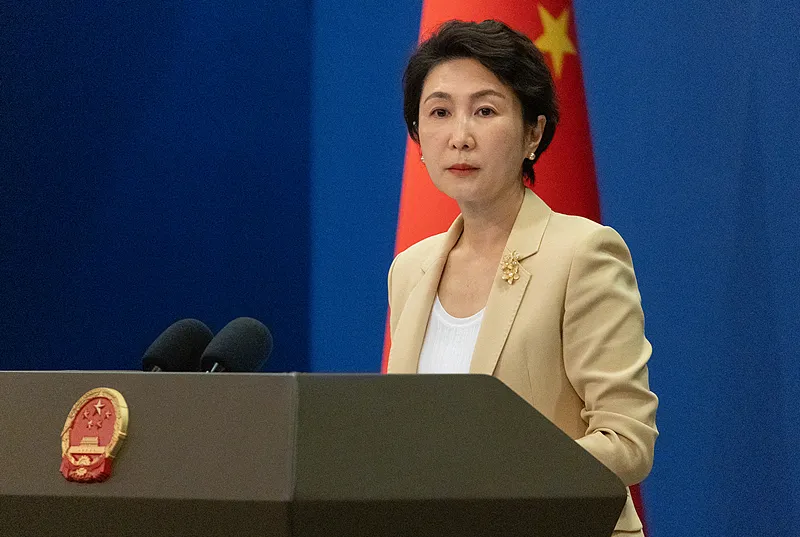China Criticises Japan's Missile Deployment Near Taiwan

China has issued a stern condemnation of Japan's plans to station missiles on Yonaguni Island, a remote location situated approximately 110 kilometres (68 miles) from Taiwan. This diplomatic dispute has intensified following statements made by Japanese Defence Minister Shinjiro Koizumi during his recent visit to the military base on Yonaguni, where he confirmed that the deployment of Type 03 medium-range surface-to-air missiles is progressing "steadily". This initiative is part of Japan's broader strategy to strengthen its southwestern islands amid growing concerns over China's military activities in the East China Sea and the potential for conflict regarding Taiwan.
Koizumi stated, "The deployment can reduce the possibility of an armed attack on Japan," countering claims that this military enhancement could escalate regional tensions. Yonaguni, Japan's westernmost inhabited island and a renowned scuba diving destination, has been home to a Ground Self-Defense Force facility since 2016, despite initial local opposition. The base already hosts surveillance radars and electronic warfare units, positioning it as a crucial asset in any potential crisis in the Taiwan Strait.
Chinese Foreign Ministry spokesperson Mao Ning sharply rebuked Japan's missile deployment, labelling it a "deliberate attempt to create regional tension and provoke military confrontation." She connected this military escalation to provocative remarks made by newly installed Prime Minister Sanae Takaichi, who has long advocated for a firmer stance against China's assertiveness in the region. Mao emphasised the need for neighbouring countries and the international community to maintain vigilance in light of these developments.
Takaichi's comments on November 7, suggesting that a Chinese military action against Taiwan could be interpreted as an "existential threat" to Japan, have particularly incensed Beijing. China perceives this rhetoric as a breach of the 1972 Japan-China Joint Communique, wherein Japan acknowledged China's claims over Taiwan. The diplomatic rift has escalated, with China summoning Japan's ambassador and demanding a retraction of Takaichi's statements, which Tokyo has refused, asserting that her remarks reflect longstanding policy.
In retaliation, a Chinese diplomat in Osaka made a controversial post threatening to "cut off that dirty neck," aimed at Takaichi. This prompted Japan to summon the Chinese envoy for clarification. Additionally, China has postponed cultural exchanges, halted discussions concerning Japanese beef imports, and issued warnings of severe consequences should Japan engage militarily.
Despite the backlash, Takaichi, a protégé of the late Shinzo Abe and known for her visits to the Yasukuni Shrine, which honours Japan's war dead, has maintained her position, framing it as a necessary defence of Japan's security in light of China’s significant military expansion. Critics within Japan, including academics, caution that her statements could potentially lead the nation into a conflict, undermining its post-World War II commitment to pacifism.
In Taiwan, the government has reacted more cautiously but expressed support for Japan’s actions. Deputy Foreign Minister Wu Chih-chung stated that enhancing Yonaguni’s defences "helps maintain security in the Taiwan Strait," reiterating Japan's sovereign right to protect its territory. Wu remarked, "Japan is a sovereign country and it has the right to do everything necessary to protect the security of its own territory, as long as such actions do not threaten other countries."
Taiwanese President Lai Ching-te called on Beijing to "show restraint" and behave as a responsible power, stressing the need for adherence to a rules-based international order to ensure regional stability. Lai's administration has strengthened defence ties with both Tokyo and Washington, viewing Japan as a vital ally against China's aggressive tactics, including frequent military incursions.
The unfolding diplomatic crisis has also begun to impact the economic relationship between China and Japan, particularly affecting the tourism sector. China remains Japan's largest source of incoming tourists, with nearly 7.5 million visitors recorded in the first nine months of 2025. However, following a travel advisory urging citizens to avoid Japan due to "personal safety risks," the Japanese tourism industry has experienced a significant downturn, as Chinese travellers accounted for almost 30% of all foreign arrivals, contributing over $1 billion monthly to the economy.
As tensions escalate, analysts such as Marcel Thieliant from Capital Economics warn of the potential for a trade conflict reminiscent of the tensions seen in the 2010s, with possibilities of China restricting exports of rare earth minerals or imposing tariffs on Japanese automobiles. With Taiwan situated a mere 100 kilometres from Yonaguni, experts express concern that minor provocations could lead to a significant and irreversible confrontation. Currently, Tokyo's missile deployment, framed as a deterrent, has resulted in accusations of provocation from Beijing, leaving the Taiwan Strait precariously positioned and raising concerns among investors about the potential for economic fallout.

Supreme Court to Review Sonam Wangchuk's Detention on November 24

Afghanistan Offers Five-Year Tax Breaks for Indian Investors

Mamata Banerjee Raises Concerns Over Election Commission Decisions

Legacy of Dharmendra Lives On with His Last Film 'Ikkis'





